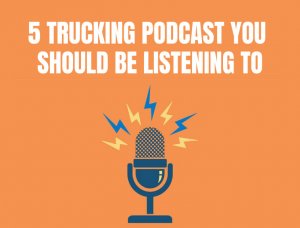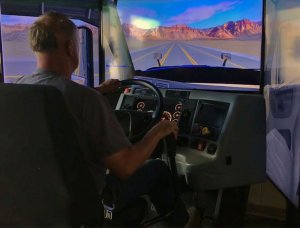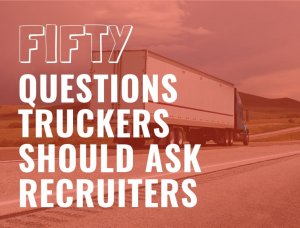Blog
Helpful Information About Potential Welding Careers & Trucking Jobs
-

What to Know About The DOT Exam
There are a variety of steps to take in order to become a professional truck driver. One step is to pass the DOT Physical Exam. The DOT Physical Exam is an examination that all truck drivers must take and pass to get their Commercial Driver’s License. This exam determines if the driver meets certain health standards set by the Federal Motor Carrier Safety Administration (FMCSA) in order to be eligible to drive. Continue reading to learn more about the DOT Exam!What Is the DOT Exam?
All truck drivers are required by law to pass the DOT Physical Exam before getting behind the wheel of a big rig. The FMCSA has set a variety of mental and physical health regulations that truckers must meet in order to fulfill the demands of a truck driving career. All professional truck drivers must hold an up-to-date physical certification at all times. Typically, drivers are required to get physicals every 1-2 years. It is important to meet the standards of the DOT physical to ensure both the truck driver’s safety on the road as well as the safety of other motorists. All candidates are asked to fill out all health questionnaires before they arrive at the office. If drivers have any of the following conditions they need to bring the following with them to the exam:- Drivers who have vision or hearing problems must bring either their glasses/contacts or hearing aids with them to the exam.
- Potential drivers with diabetes must bring their most recent and comprehensive Hemoglobin A1C (HbA1C) results and blood sugar logs with them.
- Drivers with heart-related issues must bring a letter from their cardiologist outlining the issues and limitations that the driver has as well as along with a note that they are safe to perform this kind of work.
What Can I Expect During the DOT Exam?
In addition to the necessary checks mentioned above, the DOT Physical Exam will also look for a variety of other conditions that a driving candidate may have. These will include the following:- General Appearance
- Eyes (i.e., cataracts, glaucoma, muscular degeneration, etc.)
- Ears (i.e., scarring of the tympanic membrane, perforated eardrums, etc.)
- Mouth/Throat Exam (issues swallowing)
- Heart (to detect problems)
- Lungs & Chest
- Abdominal Issues
- Vascular Issues
- Genito-Urinary Issues
- Extremities
- Possible Spinal Injuries
- Neurological Issues
What Happens if I Fail?
A candidate will fail the exam if they have the following:- Cardiovascular/Respiratory Disease
- High Blood Pressure (without medication)
- Epilepsy
- Diabetes
- Nervous/Psychiatric Disorder
- Poor Eyesight (without corrective lenses)
- Loss of one/multiple limbs
-

Discover if Bus Driving is Right for You
EDITORS NOTE: Advanced Career Institute has discontinued our School Bus Driving Program. We still offer our Commercial Bus Driver Program at select campuses. In every city, there are bus drivers. The transportation of children via school buses has been popular since the 1930s and continues to be a widely used medium of transportation. The demand for quality bus drivers is rising at a steady pace, especially in growing suburban areas. School bus transportation is safe, practical, and economical for thousands of children to travel to and from school. Parents are busier than ever and having the school bus as a transportation option is extremely valuable. With gas prices constantly shifting, more and more kids are traveling via bus to school every year. Here are 10 reasons why you should consider becoming a school bus driver:1. You Have Great People Skills.
Having strong communication skills is a must for all bus drivers. A career as a bus driver means being around different types of people every day. This can include teachers, parents, school officials and of course, kids! Empathy and understanding is a must when it comes to helping anxious children or concerned parents. Being able to communicate and understand all types of personalities are important traits for successful bus drivers.2. You Enjoy Working with Kids.
If you love kids, a career as a bus driver could be very rewarding. Having the ability to make the children feel comfortable is just as important as knowing how to drive the bus. The duties of a school bus driver aren't just confined to driving. You become an important and steady person in these young children's lives. Each day gives you the opportunities to get a child's day started off right and remind them that they are special and important.3. You Enjoy Driving.
Controlling a large vehicle can seem intimidating to some, while others may love the idea. If the challenge of driving a larger bus on the road every day excites you, there are plenty of public schools out there eager to hire you as a bus driver.4. You Care about the Safety of Children.
Fortunately, the number of school bus accidents per year is very small. This is because of careful drivers who make the safety of their passengers their top priority. Quality drivers make sure to monitor onboard conduct and see that the kids make it into their homes. They also enforce safe board and de-board procedures on a daily basis. The ability to balance concentration between the road and the onboard conduct of kids is a unique skill needed for the job. Putting the safety of children above all else is the most important aspect of the job.5. You're Calm Under Pressure.
A lot goes on inside and outside of a school bus. Bus drivers face severe weather conditions, difficult children, and overwhelming road construction at any time on the road. Bullying, fighting, and even celebrations can get out of hand on the school bus. If you have a patient manner and are able to keep a clear head when unexpected issues come up, these situations may seem like less of a challenge.6. A Flexible Schedule is a Plus.
A typical bus driver usually works early in the morning then late in the afternoon with a long break in-between. There is also the option of driving to and from field trips or other school activities for extra hours. A bus driving career could be the ideal solution if you're trying to avoid the ordinary 9 to 5 job.7. Looking for a Job with Benefits.
More and more often, the term "work-life balance" is becoming an important factor in job searches. Certain benefits offered in your career are important in maintaining this balance. Public school bus drivers are usually employed by the county where the school is located. School systems show appreciation to their bus drivers by offering them bonuses. County benefits can include extended vacation days, health and life insurance, and retirement plans.8. No Interest in a Four-Year Degree.
Starting a school bus career doesn’t require spending four years in college. Every driver must go through a training program and receive their CDL before employment. The program can be completed in as little as 8-weeks. Advanced Career Institute offers both day and evening training. No prior bus driving experience is needed in order to begin.9. Good Paying Job.
A career in the bus driving industry can mean making up to $44,000 per year. Extra earning opportunities are usually available as well. There are also several opportunities to pick up extra hours, as well as receive employee benefits from the school. You will often see bus drivers pick up other positions within the school like substitute teaching.10. You Can't Afford Training.
School bus drivers are essential employees with a very important job to accomplish. Many schools will cover their drivers’ official bus training programs to ensure top-quality employees. Besides general driving practices and vehicle maintenance, the training program teaches important safety rules and emergency procedures. For more information about the requirements to become a school bus driver or to learn more about the Advanced Career Institute Commercial Bus Driver Training, check out our website. Bus driving is a rewarding career, so get started today but contacting ACI.*This blog was originally published in 2016 and has been updated according to industry standards.
-

Tools to Become a Better Driver
In today's connected world, the amount of media content available specifically for truck drivers is incredible. Whether you're brand new to the industry or a trucking veteran, there is always a fresh blog, magazine, or forum to check out. Looking for some light reading? Give Trucking Truth or Trailer Talk a try. Wondering what other truckers are chatting about online? Join the 15.9k people participating in the r/Truckers Reddit community. But what about those long hours at the wheel when you can't stare at a computer or phone screen? That's the perfect time for podcasts to shine! Podcasts are the equivalent of radio on demand; audio content when and where you want it. Luckily for us, the explosion of podcasting in the past few years has given us plenty of listening options created by and for truckers. Here are 5 of our favorites:1. Ask the Trucker "LIVE" with Allen Smith
An oldie but a goodie, Ask the Trucker "LIVE" has been around since 2008. Host Allen Smith focuses on driver health, careers, regulations, and important industry issues. Check out episodes like "The Effects of ELD Mandate on Trucker Health & Safety."2. The Lead Pedal Podcast for Truck Drivers
Hosted by thirty-year transportation industry veteran Bruce Outridge, The Lead Pedal Podcast is a positive voice in the trucking industry with a focus on career information and interviews. Published every Tuesday and Thursday, you can also watch them record in their studio via their YouTube channel.3. Trucker Dump Podcast
A self-described podcast "for truckers, potential truckers, and curious non-truckers," Trucker Dump shares fascinating stories from the road. Check out episodes like "Coping with Rookie Drivers" or "Winter Truck Driving Tips from An Alaskan Trucker."4. The Trucking Podcast
Co-hosted by father and son duo Buck and Don Ballard, this podcast covers topics from the industry as well as all things vehicle-related. Give episodes "5 Fantastic Tow Vehicles That Will Turn Heads" or "The Best 401K For Owner Operators" a listen and hear for yourself!5. TalkCDL Trucking Podcast
Hosted by truckers for truckers, TalkCDL covers topics like trucking laws, surveys, news, and interviews. Check out episodes "Trucking Career is Better than a College Degree" or "Ruthann - Interview with Women in Trucking." The above shows have literally hundreds of episodes available to binge listen to. Many are available through multiple sources, such as iTunes, Stitcher, Google Play or even Spotify. Be entertained while staying in the know about your profession. Now get downloading! If you're ready to take the next step towards a career in the truck driving industry, the right training makes all the difference. Contact us and learn how ACI can help you reach your career goals. If you'd like more information on the Training Programs available at Advanced Career Institute, please visit our Training Programs.*This blog was originally published in 2015 and has been updated with new content.
-

A New Addition to CDL Training
Trucking schools have turned to new technology! Advanced Career Institute's Fresno Campus has added a trucking simulator to help their drivers learn to drive before hitting the road. This trucking simulator allows students to get the general feel and experience of driving behind the wheel of a "big-rig" before they set foot inside a real truck. This new technology has become a great resource to add to our CDL training.What Do Trucking Simulators Do?
Trucking simulators allow students to experience what it's like to drive a "big rig" truck without even leaving the classroom! Our simulator is complete with the steering system and on-screen display to learn the basic skills of truck driving. Skills learned within a simulator include:- backing
- sightline views from the driver's seat
- how the clutch works
- driving in various weather conditions (i.e. ice, snow, sleet, freezing rain, rain, wind, etc.)
Truck Simulators - Part of Our Curriculum:
Trucking simulators have become a core part of our driver training program here at our Fresno Campus. It has become an effective tool in teaching our drivers the basics of operating a truck before getting behind the wheel of a truck for the first time. This new technology of truck simulators provides students with a diverse set of scenarios a trucker may see while driving. This can also help increase a student's chances of passing their CDL test the first time. Simulators are a tool that we are excited to continue to use at ACI. Our goal is to continue to provide the best possible training for each student. As technologies continue to advance, these simulators become more lifelike and give students a better experience of learning to drive a truck.Come By & Visit Our Training Center:
If you are interested in seeing what our driving simulator looks like and the kind of technology we invest here at the Advanced Career Institute, please feel free to stop by. We are happy to show you our simulator as well as discuss your truck driver training options. For further assistance, please feel free to contact us. We look forward to seeing and meeting you soon! -

Finding the Best Carrier for Your Lifestyle
When considering which trucking carrier you will work for, you have many options to consider. Trucking is a job that is currently in high demand with ~60,000 available throughout the U.S. as of 2019. This high demand for truckers means that you also have your choice of which type of trucking job you would like to do. Whether you prefer to be a local, regional, or over-the-road trucking, here is a position out there to meet your needs!Speaking to the Recruiters:
During your CDL training at Advanced Career Institute, you will have the opportunity to speak with several trucking companies. When talking to the recruiters, be sure that you are getting a feel for what that specific truck carrier has to offer. Each carrier will offer their perks and benefits. It will be all about finding one that fits your particular lifestyle and your personal needs. There is no one "right choice" for everyone. Asking the right questions up front and being honest about your needs and expectations in the industry will help you come out with a satisfactory experience once you choose with whom you want to work.50 Questions to Consider Asking Recruiters:
Before you go to a recruiter event, consider writing down what you want to ask the recruiters before you commit to working for any specific company once you get your CDL. The following are 50 questions that you may consider asking as a start when you are looking to find the truck carrier that works best for your needs:- What is your company's home-time policy?
- How much time off can I expect to get through your company's home-time policy?
- Will my days off vary or be consistent?
- What is your policy for needing extra time off (i.e., medical needs, injury outside of work, illness, family emergencies, etc.)?
- What kind of paid vacation do you offer me to start?
- How much more vacation time can I earn by staying with this carrier and how long will it take for that vacation time to accumulate?
- Are there restrictions on when I can use my vacation time (i.e., only taking so long off at once, not taking off around holidays, etc.)?
- Do vacation days expire annually or can they carry over into the next year?
- How many vacation days can I accumulate before I must use them?
- Which routes do your drivers most often travel?
- How many driving miles can I expect to log?
- How many miles away from home will I be expected to travel?
- What kind of equipment do I need to get comfortable working with/
- Will my truck be equipped with air-ride suspension?
- What size (how many tons) will the truck weigh?
- Do you provide layover pay?
- How long is the average layover period?
- How many loads can I expect to haul each week/month?
- Do you require drivers to "slip-seat" to take time off?
- What do you pay drivers for each job position (i.e., local or regional drivers versus OTR drivers)?
- What kind of raises may I receive overtime?
- What is my top earning potential in this position?
- Does the cost of living in my area affect how much you will pay me?
- What are the potentials for promotions in the future?
- What do my promotion potentials end up paying once I earn them,?
- How long will it take me to earn a pay increase?
- What kinds of benefits does your carrier offer to its drivers?
- Do you offer your drivers full health insurance benefits?
- Do you provide healthcare coverage for drivers families?
- What plans can I choose from when I am picking my healthcare?
- Do you offer short-term disability coverage to your workers?
- Do you offer retirement benefits such as 401ks?
- Do you offer pension benefits to drivers?
- If you provide retirement benefits, what matches on employee contributions do you make to my retirement?
- Do you provide driver bonus opportunities?
- How do you earn bonuses and what are the criteria for qualifying for them?
- When do you provide bonus pay and when can I expect to receive any bonuses that I have earned?
- Is there a limit of how many bonuses (or the dollar value) that a driver can earn annually?
- Do you offer new driver sign-on bonuses?
- Does your carrier pay for lumpers?
- Who is responsible for loading or unloading trucks if you don't hire lumpers?
- Do drivers ever have to unload their trucks?
- What are your deadline policies for delivering goods?
- What are the consequences for me as an employee if a delivery deadline gets missed?
- What about missing deadlines for circumstances beyond my control (i.e. truck breakdowns, personal health issues, bad weather, closed roads, traffic, accidents, etc.)?
- Will I get a dedicated truck driver manager?
- What type of on-the-job training will I receive as a new driveR?
- Do I receive mentorship as a new driver?
- What are the policies you have on how many hours I must rest versus how many hours I may drive at one time?
- Are there any other company policies or rules of which I need to be made aware?
-

Which Welding Career Path is Best for You?
People who get into welding are those who love to work with their hands and are not afraid to get dirty while doing it. Welders take pride in their job and want to do their best at every project they take on. When started a career in welding, are a variety of job options for those who have completed their degree and are looking for work. The following are seven welding careers you may not have thought of:Assemblers and Fabricators:
These individuals work to put the finishing touches on a variety of consumer goods that we purchase in our daily lives. They use their welding skills to help finish making items such as toys, electronic devices, and computers. Assemblers and Fabricators also work on other vital pieces of our country's infrastructure such as modes of transportation. They help build forms of transportation such as aircraft, ships, and boats.Boilermakers:
Boilermakers produce steel fabrications such from plates and tubes. Originally, boilermakers created boilers, although today they develop a variety of different technologies including bridges, blast makers, and other mining equipment. Many of these welders travel to the worksite to do their work. This line of work may mean some regional or national traveling to perform their welding on the structures that need to be worked on.Jeweler, Precious Stone, and Metal Workers:
Many welders that work in the jewelry field spend their days at a small bench hunched over a specific piece of jewelry that they are working to repair. Most jewelry that they work on will be higher-cost pieces that include precious stones and metals such as gold. The goal is to get the piece close to original condition as possible to get the value of the piece as high as possible.Machinists, Tool, and Die Makers:
These welders work on welding pieces of machines or tools that get used in a variety of different fields including transportation (i.e., automobiles, trucks, buses, aircraft, planes, or boats) or the construction industry (such as welding and finishing off construction tools). This sect of welders often has to work nights and weekends to get their jobs completed on a strict timeline for other automotive or construction projects to be able to move forward on their set schedules.Sheet Metal Workers:
Sheet Metal Workers are welders who are responsible for welding sheets of metal together to create finished products. Most sheet metal workers work to generate heating and air conditioning systems which require these sheets of metal to be welded together to produce these units for both commercial and residential buildings. Sheet metal will often get heavy, and the structures that these welders work on become very sizable. Heavy lifting and moving large, finished pieces of work are all part of the job.Plumbers, Pipefitters, and Steamfitters:
These welders work primarily in the construction industry to help work on building projects that are still getting completed. They often work on plumbing and pipefitting in both commercial and residential buildings. Their jobs are to ensure that the plumbing, piping, and ductwork in buildings is up to the building code and safety standards outlined in that area. These workers will have to travel to the construction site to perform their work. Deadlines are also standard in this field of welding as the plumbing and pipefitting must get finished before the next phase of construction can begin.Metal and Plastic Machine Workers:
Metal and Plastic Machine Workers are welders who set up and operate machines that are responsible for cutting, shaping and producing both metal and plastic pieces that get used in the construction of a variety of goods that get created in our modern, consumer society. These products are often required to get built to certain safety standards set forth by the industry for which the product is getting designed. There is a variety of options for welders when it comes to choosing a long-term career. Dream big and find a career that fits your desires and needs as a welder! In the end, it will make work a pleasure, and not a chore as the options in the welding field are genuinely endless. For further information on Advanced Career Institute's Welding Training, contact us today!*This blog was originally written in 2016 and has been updated according to industry standards.


 All
All Trucking
Trucking Welding
Welding From the Experts
From the Experts